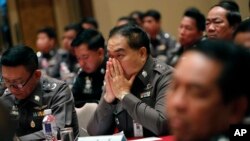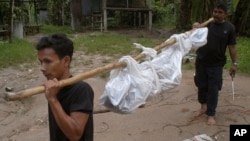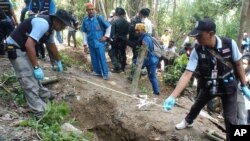Thailand is proposing talks with Malaysia and Myanmar to discuss the problem of human trafficking, following the discovery of dozens of fresh graves of apparently trafficked migrant workers. Dozens of police and local officials have been transferred or detained for suspected involvement in the trafficking activities.
Thai authorities have been criticized by foreign nations and human rights groups for years for not taking serious steps to address the country's human trafficking problem.
But Thai Prime Minister Prayuth Chan-ocha is now calling for a regional response involving Myanmar, where many of the ethnic Rohingya migrants come from, and Malaysia, where the trafficking networks also operate.
Scores of graves have been uncovered in jungles in Thailand's southern border province of Songkhla, close to the Malaysian border, with the sites capable of holding the remains of hundreds of smuggled undocumented migrants.
Most of those trafficked are Rohingya Muslims from Myanmar’s Western Arakan state who are largely stateless as well as migrants from Bangladesh. They leave home seeking work in Malaysia or more distant Indonesia, but are swept up by trafficking gangs who hold them for ransom.
Rights activists have long suspected state officials and security forces of involvement in the trade that involves boats sailed from Arakan State onto shores in Thailand, then camps for holding the migrants before they are taken over the border into Malaysia.
On Thursday Thai investigators transferred more than 50 police from the region, pending an investigation of their involvement in the trade. Late Friday Thai media reported police had detained the head of a local municipality, allegedly the ringleader of Rohingya trafficking in Songkhla.
Australian Foreign Minister Julie Bishop, in Thailand for official talks, welcomed the investigations and the Thai government response.
“The discovery of those bodies and the circumstances surrounding that in southern Thailand are shocking. It’s obviously a terrible tragedy. But I acknowledge the fact that the Thai government has responded in a timely fashion. That there is an investigation – we certainly welcome that and we will continue to provide support and levels of cooperation where we can,” said Bishop.
The undocumented migrants pay the traffickers on average around $2,000. Those unable to pay are often assaulted before calling relatives to make the payments.
The Rohingya have faced increasing persecution in recent years. In 2012, outbreaks of sectarian violence left more than 100,000 Rohingya corralled in refugee camps, facing poverty and an uncertain future.
On Friday Malaysia-based labor rights group Tenaganita said it had received reports of undocumented migrant workers having disappeared in Malaysia, and pressed for investigations into the human trafficking activities in that country.
Other rights activists say most camps are now in Malaysia, often capable of holding up to several hundred people at any time. But rights workers say conditions in the camps are often appalling, with many detainees perishing from malnutrition and starvation.
The United Nations Office on Drugs and Crime (UNODC) estimates the smuggling of migrants in Asia generates up to $2 billion a year for regional criminal groups.














